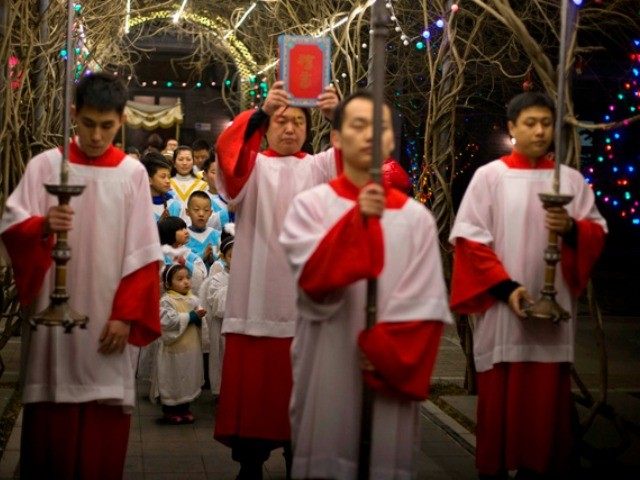Fears are mounting among Chinese Christians over newly revised religious affairs regulations, as President Xi Jinping continues to tighten his grip on religious bodies.
China’s State Administration for Religious Affairs (SARA) has published a new set of regulations overhauling religious practice in the officially communist country. Despite China’s claims of “religious freedom,” the U.S. State Department as well as numerous watchdog groups consider China to be guilty of systemic religious oppression, which appears to be getting worse, not better.
Church officials reportedly fear that the new norms released by the communist government will be used to “further suppress religious activities” rather than pursuing their stated aim of protecting national security.
As Breitbart News informed earlier this month, one report on China’s new regulations claimed that the norms are consciously intended to “annihilate underground communities” and “suffocate official communities,” rather than merely organize them.
According to Anthony Lam, executive secretary of the Holy Spirit Study Center in Hong Kong, the provisions show that authorities are pursuing a goal of total religious control, and reflect the differing governing style of President Xi Jinping in comparison with his predecessor, President Hu Jintao.
In a report by UCA News, Lam underscored the tighter restrictions on “unauthorized religious” venues in the new regulations as an excuse for government crackdowns on religious activities, adding that both open and underground communities of the Catholic Church in China will be affected when the norms come into effect on Feb 1, 2018.
Lam also suggested that the loosely written regulations will allow authorities to subject the open communities—whose leaders register with the government—to cash extortion demands over definitions of what may constitute “unauthorized” religious venues.
Ying Fuk-Tsang, director of the Divinity School of Chung Chi College in the Chinese University of Hong Kong, said that the new emphasis on “the rule of law” was aimed at tightening control over religious affairs. The Chinese government has claimed that the emphasis was designed to protect religious freedoms of China’s citizens, something Ying said is impossible.
According to the new regulations, religious entities must not only comply with the state constitution, laws, and regulations, but also practice “core values of socialism.”
Ying said he feared the stricter rules seek to undermine the essence of faith.
An underground priest of the Wenzhou Diocese, identified only as “Father Joseph,” expressed concerns about organizing large-scale religious events for fear of harsh penalties if they were deemed unauthorized.
If a religious group holds an activity without permission, authorities could impose a minimum fine of more than $15,000, according to the new rules, and revenue from gatherings and property could also be confiscated.
Another priest, “Father John,” said that in substance the new regulations didn’t differ too much from the old, but that a controlling “rope” had been tightened.
This tougher approach was “not good news” for the underground church, which refuses to join the Catholic Patriotic Association, he said.
According to Article 5 of the regulations, all religions must adhere to the principles of national independence and self-governance, and religious groups, schools and venues may not be “controlled” by foreign forces, a code word often used to indicate faithfulness to the Vatican.
“This article is still an insurmountable obstacle for the unity of the China Church,” Father John said.
“I don’t know whether the Vatican can see this clearly,” he added.
Follow Thomas D. Williams on Twitter Follow @tdwilliamsrome

COMMENTS
Please let us know if you're having issues with commenting.